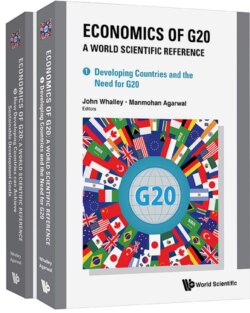Читать книгу Economics of G20 - Группа авторов - Страница 36
На сайте Литреса книга снята с продажи.
Introduction and Background
ОглавлениеThis chapter discusses the impacts the G20 process has had and might have in the future on development as a global issue. The G20, as it exists for now, has evolved from the G8 meetings at the leaders’ level and the finance ministers’ meetings at the G20 level, but it is now much more than a larger G8, with a troika secretariat, an assertion of global economic policy coordination and cumulative communiqués and directions from sequential meetings. The G20 was born during the 2008 global financial crisis and, as it has grown beyond the initial crisis management entity that it was at formation, it provides a potential opportunity for a major future reshaping of global arrangements on many dimensions of economic policy including development; but political agreement at the leaders’ level will be needed for this to occur, as well as the acceptance of new structures by the existing Bretton Woods institutions — the International Monetary Fund (IMF) and the World Bank — and others. This process may occur only in the long run; even if the G20 were to incrementally mobilise resources for development and strengthen existing international disciplines, this would be good for development.
On the issue of development, there have been questions raised regarding the legitimacy of G20, given the majority of developing countries are not G20 members. Through the G20, the larger developing countries (China, India and Brazil) are now seemingly equal parties at the global policy coordination table. Indicative of this potential for the evolution of the G20 was the pressure from Korea for development to be centrally added to the G20 agenda for the November 2010 G20 meeting in Korea. Development had been discussed earlier, however, as an instrument for rebalancing the world economy by narrowing income gaps, and more recently in the context of specific issues such as infrastructure and food security. From Korea emerged the Seoul Development Consensus which, while limited in specifics, spelled out general objectives.
We argue that, despite concerns over legitimacy, the G20 is an appropriate platform for discussing development issues even though the G20 does not include the majority of developing countries. Development issues span many ministries in countries and many international agencies, and only heads of government can mobilise these different bodies, give them direction and coordinate their action both across and within countries. The G20 includes the economically important countries and these can consult with those not included. Its structure being weighted less towards the major developed countries, unlike many International Financial Institutions (IFIs), gives it some legitimacy which will be enhanced if wide-ranging consultations are held.
It has developed a working relationship with the IFIs and UN agencies as it has called on their help, as noted in the following sections, in dealing with the development issues it has identified thus far. Such a relationship has the advantage that conflicts of interest at the implementation stage might be avoided. The G20 can also enhance the legitimacy and effectiveness of other international bodies.
The G20 has identified two priority areas which impact development — infrastructure and food security. Relevant international agencies have prepared papers and proposals to deal with these issues. These actions are part of what was agreed as the broader Development Agenda Consensus at Seoul in 2010 and the part that the G20 has concentrated on in subsequent meetings.
Against this background, the chapter discusses what the G20 can realistically be expected to deliver on the development front. For now, the G20 has mobilised other bodies for advice, which seems appropriate to us as these other bodies would have to undertake the necessary actions. As yet, the G20 has shown no tendency for micromanagement.
Building on this, we suggest that the G20 can also attempt to incorporate development considerations more directly into their core agenda. They have, in their declarations, stressed that part of the delivery of strong, sustainable and balanced growth (SSBG) is to raise incomes in low-income countries (LICs). They have reiterated that they intend to deliver on all three aspects of the framework. While the broader Mutual Assessment Process (MAP) in the G20 does not include dealing with how policies affect development, the G20 has mandated the Development Group to examine how the contribution of national policies to development can be monitored and how countries can be made accountable through the Multi-Year Action Plan for Development.
In the medium to longer term, the G20 could also potentially move incrementally in the direction of addressing the twin deficiencies of lack of direct control over resources and lack of legal structure in ways that potentially help development.
The actual record of delivery on development has been disappointing. We therefore argue that the G20 can, if there is political will, reopen the debate on how development can be achieved, the necessary financial flows to developing countries and set priorities for trade, such as maintaining developing country export market access in a weakened world economy. The future of the development agenda of the G20 would thus seem to be to move to implementation of specific policies and instruments, while setting broad priorities and perhaps to implement incremental initiatives. How far it can go in examining how policies of individual countries affect development prospects of countries remains an issue, but broader questions of special arrangements to help development and even the special and differential treatment of developing countries in G20 decisions (as in the World Trade Organization (WTO) and other international bodies) beckon.
